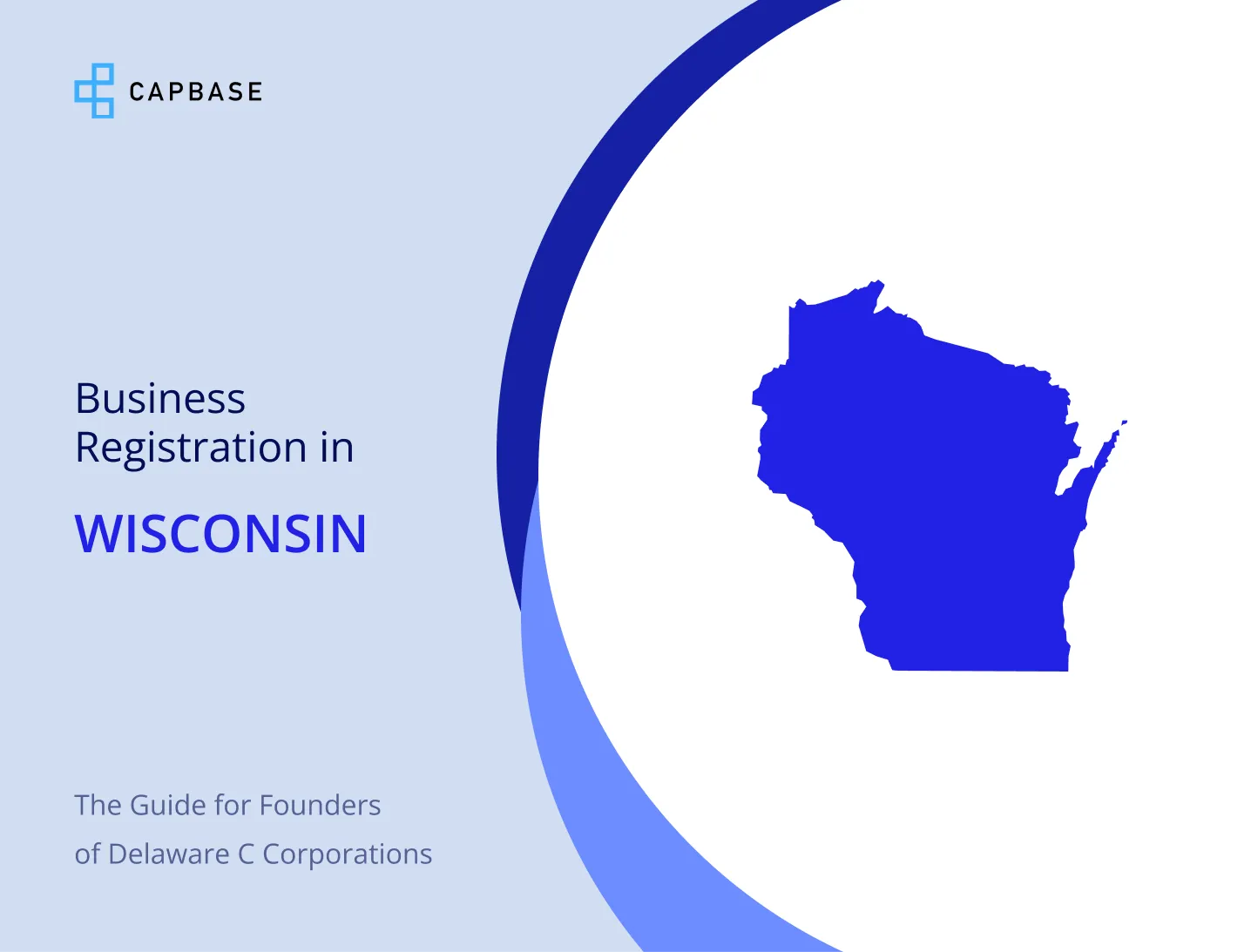
Registering Your Startup To Do Business in Wisconsin
 by Capbase Staff • 7 min readpublished September 8, 2022 • updated December 4, 2023
by Capbase Staff • 7 min readpublished September 8, 2022 • updated December 4, 2023
Related

Stay ahead of the curve
You’ll get actionable advice, comprehensive guides, interviews with founders, and more.
Forming your company structure in Delaware, specifically a corporation, allows you a lot of flexibility, but depending on which state you operate in, you may still need to observe local rules.
If you conduct business in the State of Wisconsin, you must register with the state. We'll go over the steps and simplify them. But first, how can you tell if you're doing business lawfully in Wisconsin?
When to register as doing business in Wisconsin
The State refers to Delaware C corps and all other corporations, limited liability companies, limited liability partnerships, non-profit organizations, and other business entities incorporated outside of Wisconsin as "foreign" corporations (also referred to as “foreign entities”).
There is not a clear definition of what constitutes “doing business” in the state. However, Wisconsin statutes provide that the following actions do not necessitate registration with the state:
- Keeping, defending, or resolving any civil, criminal, administrative, or investigative proceeding.
- Holding meetings of its members or managers, or engaging in any other internal affairs-related activities
- Maintaining bank accounts with financial institutions located in the State.
- Keeping offices or agencies for the transfer, exchange, and registration of the foreign limited liability company's own securities or interests, as well as keeping trustees or depositories for those securities or interests.
- Using independent contractors to sell.
- Soliciting or obtaining orders, whether by mail, employees, agents, or otherwise, if the orders require acceptance outside of this state before becoming contracts.
- Lending money or creating or acquiring debt, mortgages, and property security interests.
- Securing or collecting debts, as well as enforcing mortgages and security interests in real estate to secure debts.
- Having property without more.
- Conducting a single transaction that is completed within 30 days and is not part of a series of similar transactions.
- Transacting business in interstate commerce.
When to register to collect sales tax in Wisconsin
Every state has different rules about when a corporation is required to pay sales tax. These are referred to as sales tax nexus regulations.
You can think of the nexus as a special version of that state’s border; if you perform certain business activities within that border, you fall into the state’s sales tax nexus, and you’re required to register for and collect state sales tax.
Typically, these actions take the form of buying and selling goods and services, but it could also include holding inventory within the state (including merchandise held by Fulfillment by Amazon merchants).
In Wisconsin, the sales tax nexus rules only apply to sellers who sell physical goods or services to Wisconsin residents.
Until the 2018 Supreme Court decision on South Dakota v. Wayfair, Inc., selling or buying non-physical goods—like subscriptions to streaming services, SaaS memberships, etc.—did not, generally speaking, qualify you for sales tax nexus. Now, if you buy or sell non-physical goods or services in a state, you may fall within its sales tax nexus.
Wisconsin Sales Tax Nexus (physical goods and property)
If you have a physical presence in Wisconsin, then you will likely need to collect and remit sales tax. The Wisconsin Department of Revenue is not particularly clear on what physical presence in the state. Traditionally, you would be physically present in a state if you have warehouses, retail spaces, or employees and/or representatives of the business in the state.
You will need to pay sales tax as long as you have physical presence regardless of any minimum thresholds. You can learn more about physical presence for sales tax purposes through the State’s website.
Wisconsin Sales Tax Nexus (non-physical goods and property)
The new state sales tax laws applying to non-physical (ie. internet) sales allow you to qualify for sales tax nexus even without physical presence or goods. In Wisconsin, you need to cross a certain threshold to qualify.
You will need to collect and remit sales tax if your business has either $100,000 or more in gross sales to Wisconsin-based customers, or generates 200 or more separate transactions of taxable or exempt products in Wisconsin. These thresholds went into effect as of October 1, 2018. If you would like to take a deep dive, you can check out the State’s website.
As usual, this isn’t legal advice—just a guide. If you’re not 100% clear on whether you fall within Wisconsin’s sales tax nexus, it’s best to confer with your legal counsel and/or an accountant that has expertise in Wisconsin’s legal code and tax regulations.
How to register your non-Wisconsin business with the State of Wisconsin
You must complete the following steps to become a qualified foreign business in Wisconsin:
- Select a name under which to do business. This doesn’t have to be the name you registered when incorporating in Delaware, but it can be. The name you choose has to be unique, and you can check to see if a name is already in use by conducting a name search through the State’s online business registry. If the name you wanted to register is already in use, you can register your company to do business in Wisconsin under an “assumed name” (which is also known as a “doing business as,” “DBA name,” or “fictitious name” in other states).
- Fill out an application. You’ll need to file a Foreign Business Corporation Certificate of Authority Application to the Wisconsin Department of Financial Institutions along with a Delaware Certificate of Good Standing.
- Pay the fee. Your filing fee depends on the stock value of your company. However, the minimum filing fee you must pay the Wisconsin Department of Financial Institutions is $100.
- Submit your Foreign Business Corporation Certificate of Authority Application.
- Wait. Processing typically takes two to four weeks.
Once you’re approved to operate as a qualified foreign business in Wisconsin, you’ll need to comply with certain requirements.
Compliance as a Qualified Foreign Business in Wisconsin
To stay in compliance and continue legally doing business in Wisconsin, you need to meet two requirements: maintaining a resident agent and filing your annual report. On top of that, you may also need to pay a corporate income tax.
Registered Agent in Wisconsin
Your registered agent in Wisconsin is your point of contact with local authorities. If you don’t have a physical street address for your company in Wisconsin, it may be advantageous to find a registered agent to receive state notices on your behalf.
Foreign corporations are required to have a registered office in Wisconsin. The office cannot be a P.O. box, rather it must be a physical address of your registered agent or a licensed registered agent service.
Your registered agent will forward any important information, such as business mail, to you. There are a number of firms that contract out registered agents. They typically cost $50 – $100 per year.
Annual Reporting in Wisconsin
Every year by March 31st, you must file an annual report with the State, updating any changes to the company address or the composition of the Board and officers. You’ll include info like:
- The legal name of your business
- The name and address of your registered agent
- The names and addresses of board members, managers, and officers
Your minimum filing fee for the annual report is $65. Your actual filing fee is calculated based on the stock value of your company.
Paying franchise tax and corporate income tax in Wisconsin
Wisconsin has a franchise tax and corporate income tax. The corporate income tax is assessed on foreign corporations that do not pay the franchise tax. A franchise tax is typically calculated based on the net worth of or capital held by the entity. A corporate income tax is a tax imposed directly on the income of your corporation. It is possible to file annual taxes electronically through the Wisconsin Department of Revenue’s online portal.
For more information on filing and paying your franchise tax or corporate income tax via mail, please see the following guidance from the Wisconsin Department of Revenue.
The due date for Wisconsin state franchise tax is the 15th day of the 3rd month after the end of the tax year.
Sales Tax Registration In Wisconsin
If you meet the requirements to collect and remit sales tax in Wisconsin, you will need to register with the Wisconsin Department of Revenue. There are different permits and certificates that you can sign up for that best suit your needs.
You can learn more about the different permits and certificates through the state’s website. Once you know which is the best for your company, you can register online with the Wisconsin Department of Revenue.
Hiring And Paying Employees In Wisconsin
When you hire a new employee in Wisconsin, federal and state laws require that you report new hires within 20 days of their hire date. You can report your new hires online.
Your payroll provider should be able to take care of paycheck withholdings, but it’s up to you to register as an employer with the State and set up an online employer account.
For a comprehensive guide of your responsibilities, Wisconsin provides the following information.
The Easiest Way To Register Your Business In Wisconsin
To register your business in Wisconsin, you’ve got to keep track of a lot of moving parts. Failing to file the right forms, provide the right information, or stay on top of compliance laws can lead to serious headaches.
Capbase makes it easy. When you incorporate your Delaware corporation on Capbase, we will generate the required information needed to register to do business in Wisconsin and keep you up to date on any required filings.
The compliance calendar inside your Capbase account will notify you of upcoming fees, reporting, or other requirements, so you can keep your startup in good standing with Wisconsin state officials.

Written by Capbase Staff
Capbase is a team of designers, engineers, and business professionals spread across 6 time zones on 3 continents united by our passion for dogs, coffee, and great software.
Related
American Samoa Business Entity Registration for Delaware Corporations
Is your company doing business in American Samoa? Get an easy-to-follow explanation about what forms you’ll need, information about registration fees, filing deadlines, naming requirements, and more.
 by Capbase Staff • 7 min read
by Capbase Staff • 7 min readRegistering Your Startup To Do Business In West Virginia
Is your company doing business in West Virginia? Get an easy-to-follow explanation about what forms you’ll need, information about registration fees, filing deadlines, naming requirements, and more.
 by Capbase Staff • 7 min read
by Capbase Staff • 7 min readRegistering Your Startup To Do Business In Maine
Is your company doing business in Maine? Get an easy-to-follow explanation about what forms you’ll need, information about registration fees, filing deadlines, naming requirements, and more.
 by Capbase Staff • 7 min read
by Capbase Staff • 7 min read